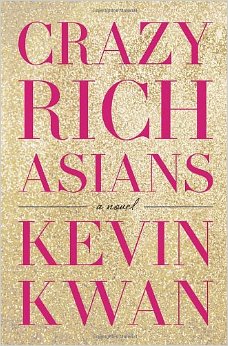Crazy Rich Asian by Kevin Kwan was a fantastic contrast to my last read How to Get Filthy Rich in Raising Asia by Mohsin Hamid. Crazy Rich Asian is a quick, breezy superficial yet fun read.
While it may try to be satire, Crazy Rich Asians seems more like a balance between parody and voyeurism of the new ultra rich. Half the fun is its novelty and “Asia exoticism”: it takes the reader on a “crazy rich Asian” tour of Singapore’s ultra rich where temperature controlled closets (leather shoes are kept 15 degrees cooler than the cashmeres) are the norm.
The main plot revolves around two protagonists, Rachel Chu (an ABC or American-born Chinese) and Nick Young, as they travel to Singapore for a wedding between two of the region’s wealthiest families. Rachel, previously unaware of Nick’s wealthy upbringing, is thrown into an Asian “Downton Abbey” and we follow her as she tries to make sense of all the ostentatious wealth and the wealthy’s boundless obsession with social and material status.
Through Rachel’s eyes, we are introduced to not only the ultra-rich but the complicated dynamics of the wealthy Mainland Chinese versus the Overseas Chinese and the very private old rich to those who only desire to expand their vulgar display of wealth. Other stereotypes abound like Filipino maids who love Sinatra’s “My Way” and old fashion snobbery where Stanford “is that school in California for people who can’t get into Harvard.”
Of course all of this serves as an interesting setting for gossip, intrigue, and scheming among the three wealthy families in Singapore on who marries whom, guessing who among them inherits what, and the various power plays between and among families.
To remind the readers of the seemingly unlimited wealth the rich seeming have, we learn of family friends who “flies all her saris back to New Delhi to be specially cleaned” and almost ever noun is crammed up against a brand name, e.g “Parker, put down those Pierre Hardy flats or I’ll poke your eyes out with these Nicholas Kirkwood stilettos”.
It is unfortunate that Kwan could not push the novel further. There is much room for a more proper satire given the interesting setting. And then there’s the case of perhaps better a little better editing, the novel stumbles a bit on the spelling of some Malay words.
On another note, Nina Jacobsen, producer for the Hunger Games, has bought the film rights to Kevin Kwan’s book. With talk of the twenty-first century as the “Chinese Century” or the very least as the “Asian Century”, Crazy Rich Asian on film would be the perfect piece that captures the exciting region du jour (anything Asia) and the extravagance of the new rich coming from Asia.
